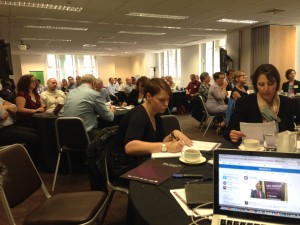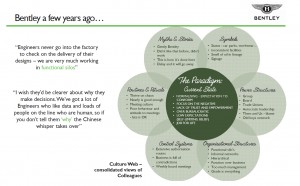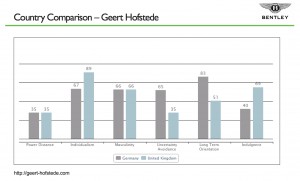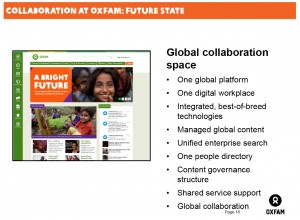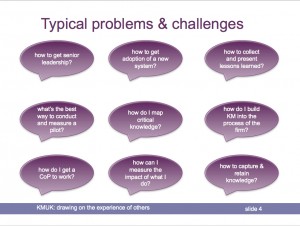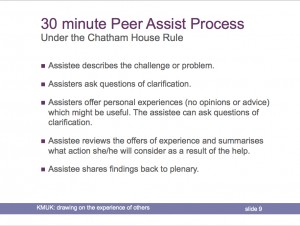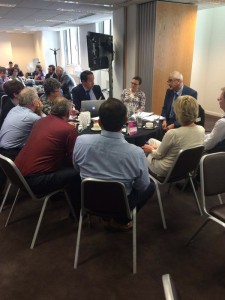Yesterday was interesting. I was in the cloud metaphorically speaking.
future of the Internet

From left: Patricia Lewis, Carl Bildt, Dame Wendy Hall, Michael Chertof, Sir David Omand
It started at Chatham House and a fascinating discussion held “on the record” on the future role of the Internet (“the most important infrastructure in the world”) prompted by a report from a very well qualifiied group of 28 experts led by former Swedish Prime Minister Carl Bildt.
This quote from their report targeted at public policy makers caught my eye:
The Internet has connected more than three billion people in just a few decades, however, over half of the world’s population remains off-line. If the rest of humanity is not given the opportunity to come online, digital and physical divides both within and between societies will widen, locking some into a permanent cycle of exclusion from an increasingly digital global economy.
Countries cannot hope to compete in the global marketplace of ideas if their business communities and broader populations are not online.
One Internet can be found here. Distributed under a creative commons licence Its worth a read. A few of my many takeaways from yesterday’s event:
- Internet is in danger of becoming the ‘splinternet’ as governments seek to improve cybersecurity and restrict who can access what
- Cybersecurity wears many hats. In totalitarian regimes it means controlling access to what is considered ‘destabilising’ and salacious material not merely espionage
- False news is on the rise underpinned by the self reinforcing bias of Social Media sites (more on this later)
- The role of educators is vital to equip tomorrow’s workforce to be digitally literate (see Arab Times article by Dana Winner for more on initiatives in Kuwait)
- “Its the end of the industrial age and the beginning of the digital age” and “we are coming to the point of contraction” (Quotes from Dame Wendy Hall)
2017 Legal KM Objectives
This very nicely set up the afternoon’s video session at Ark Group ahead of the forthcoming KM Legal Europe Conference in Amsterdam. I was asked half a dozen questions. Here I will focus on:
What do you think are the key challenges facing knowledge managers in law firms specifically right now?
To answer this I approached two dozen practitioners and thought leaders in Legal KM last Thursday. I used LinkedIn for some and a personal direct email for others. I received 14 responses within a day a response rate for which I am extremely grateful.
Here is a truncated snapshot of the responses (my groupings) with anonymity preserved:
| Cultural & Organisational | Measurement & Regulatory | Process & Innovation | Tools & Techniques |
| New roles needed: business and data analysts and legal project managers. | Getting good enough metrics to convince lawyers that it is worth spending time and money on KM
|
Building knowledge into business processes by automating workflows using lightweight new technologies such as HighQ | Artificial Intelligence for law firms (as we are not a magic circle firm so we could not invest millions in this)
|
| Essential Collaboration between Knowledge, IT and procurement teams | Court Proceedings are ‘going digital’ as of the beginning of February. That’s a big challenge! We have to get our dms, our processes and our technical infrastructure ready | Increasing client pressures to redact documents or not to share documents in KH is putting pressure on open KH systems | AI tools that can mine unstructured content for insight – is it the death of the document? |
| How to maintain lateral and peripheral vision towards the business goals, where their area of practice fits in to the greater perspective at hand. What can be done daily, weekly, monthly, to take time to do this, when their entire perspective is tied to billing in 6 minute increments, tied to AFA agreements built on efficiency and transparency geared towards the client and their practice area billing requirements? | Measuring ROI on client relationship development activities – i.e. not winning new clients, but deepening existing relationships
Getting engagement from fee earners as they struggle to meet their chargeable targets
|
How can knowledge (in widest sense) help firms deliver on the more for less agenda, both internally and to clients?
Preserving client-lawyer face-time, trust and intimacy in a time of online communication How to better share knowledge with our clients (meaning the clients of the firm)?
|
Understanding how to harness the power of AI in the business:
– to what / where is it best applied? – is there a first mover advantage or should we wait, learn from innovators’ mistakes and leapfrog with v2.0? Platforms for commodity work, Artificial Intelligence in all its form, Block chain, Big Data. It is hard to keep up and very unpredictable what it will bring and how it will change the legal business |
| Move from paper sources and library towards a digital Knowledge Centre, while trying to cope with the increasing information overload. | Disruption of legal services
Horizon scanning for us and for our clients.
|
Untangling the appalling hype and confusion about AI |
A few stood out (some strategic, some operational): act or wait (in relation to AI); responding to a change in regulation; creating a Digital Knowledge Centre (will AI make that obsolete?); and how to resolve the difficult challenge of preserving client-lawyer relationship when technology makes advice more of a commodity.
future of Legal Knowledge and Information Management in an artificial world
You will note how often AI comes up in the 2017 objectives. This is the question I was asked:
Everyone is talking about artificial intelligence (AI) in the legal sector right now. How do you think AI can really boost efforts to better manage knowledge within a firm?
Many books have already been written on this topic and thousands of articles. Its the new nirvana. Even though AI has the potential to lower barriers to entry have we been there before? Not according to Professor Mohanbir Sawhney in an excellent article in September’s Harvard Business Review entitled Putting Products into Services he argues:
…By leveraging the power of algorithm-driven automation and data analytics to “productize” aspects of their work, a number of innovative firms are finding that, like Google and Adobe, they can increase margins as they grow, while giving clients better service at prices that competitors can’t match. Productivity rises, efficiencies increase, and nonlinear scale becomes feasible as productized services take over high-volume tasks and aid judgment-driven processes. That frees up well-paid professionals to focus on jobs that require more sophistication—and generate greater value for the company.
I see this as being an evolution rather than a revolution. We are at stage 3:
- Stage 1 Search: Making documents, images and audio/video available and tagged
- Stage 2 Review & Connect: Analysing and summarising documents, images and audio/video and pushing to relevant people. Identifying patterns and making connections.
- Stage 3 Predict & Facilitate: Using the raft of data, information and accumulated knowledge to predict what the likely outcome of an event or series of events might be and to then help facilitate those outcomes.
If you accept that 80% of a company’s data is unstructured there is ample scope. So what options do firms have?
- Partner
- Build
- Buy (or rent)

Two of the new buildings in City Road, London
Some of the biggest firms have already moved forward: Dentons has gone down the partner route investing in Next Law Labs and acting as a test bed for their ideas; Pinsent Masons have opted to build their own, a do it yourself AI called TermFrame; Linklaters signed up to buy/rent from RAVN and in a really interesting move Cotswold Barristers have become ‘barristers direct’ marketing their fixed fee services to potential claimants.
What’s interesting is how well represented the UK is in the AI field and how many of the emerging businesses can be found around City Road in Tech City, London.
Yet despite the hype AI has a chequered recent history:
- Both the US Presidential Elections and Brexit Referendum were called the wrong way
- The challenge of the self reinforcing bias is not met which makes outcomes susceptible to false news and accentuates the Prism Effect
- Humans are still needed for interpretation, managing of networks and facilitation of outcomes.
and finally
I am going to draw on two quotes from the respondents (both highly visible and respected Legal Professionals who find themselves in roles that have KM components):
AI and automation models if put in place successfully would augment the journalists*, augment the attorneys, make them more successful for themselves, the client, and the business.
*This was in reference to a John Oliver sketch on US TV about the impact AI is having on journalism. See Chicago Tribune summary here.
The rise of newer forms of technology is challenging the way codified knowledge is managed leading to the need for KM professionals to work with new types of colleagues such as business process improvement specialists and AI providers.
If you want more, I suspect one of the topics for discussion in the Open Space Peer Assist session I will be running at KM Legal Europe will be on the impact of AI. There’s still time to register for that event and I’m sure Ark will put online the video interview I conducted yesterday.
Stop Press:
Today DeepMinds and Royal Free Hospital’s App is launched. It is a great example of how data can be analysed and outcomes presented to the clinician for recommended treatments. Substitute the Lawyer for the Clinician and it’s clear similar search, retrieval and analysis tools might be used in Legal. See here for more.
References:
Thanks to Martin White (self styled ‘Virtual Librarian’) for these hugely helpful links:
http://www.abajournal.com/magazine/article/how_artificial_intelligence_is_transforming_the_legal_profession
https://artificiallawyer.com/
https://blogs.thomsonreuters.com/answerson/artificial-intelligence-legal-practice/
http://www.neotalogic.com/ai-business-law-iii-rise-administrative-automation/
http://www.pwc.co.uk/industries/business-services/law-firms/survey.html
Also to Exponential Investor who provided this interesting interview transcript as part of its investor service:
http://www.exponentialinvestor.com/they-know-what-youre-going-to-buy/?email=paul.corney%40btinternet.com

